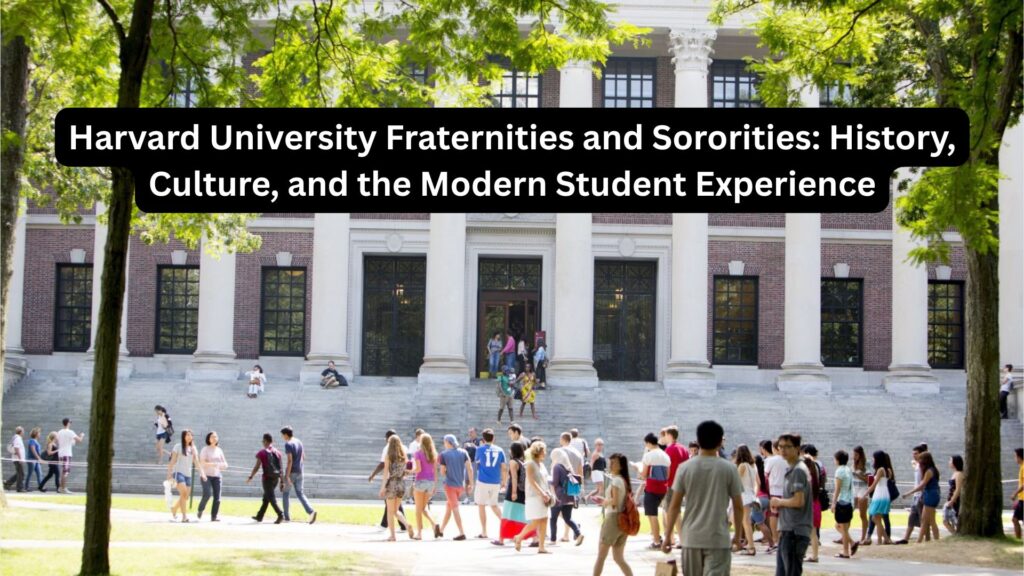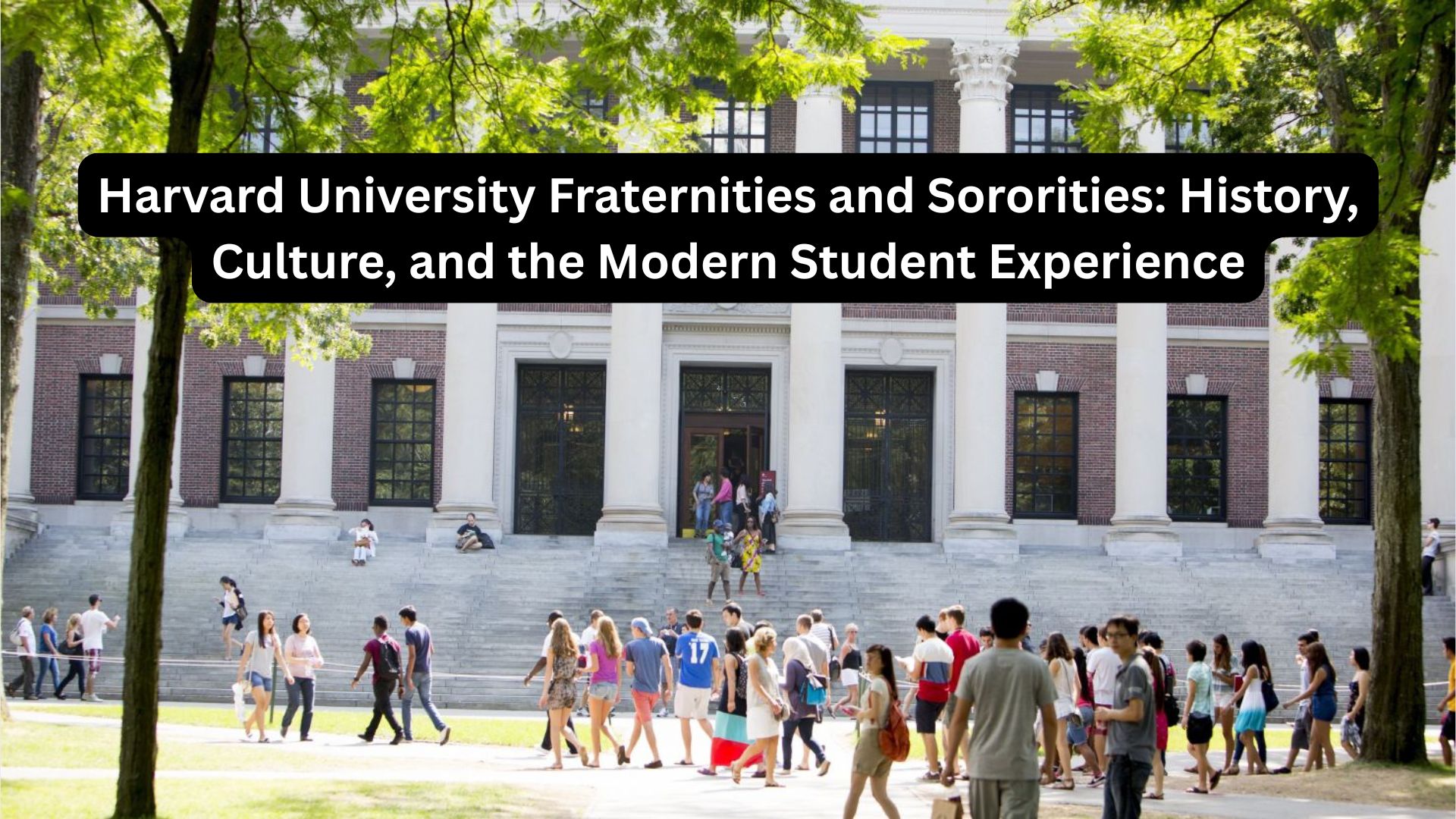Harvard University Fraternities and Sororities: Harvard University, one of the oldest and most prestigious institutions of higher learning in the world, has a rich and complex history that extends beyond academics and research. Among its many social traditions, one of the most debated and intriguing aspects has been the presence and evolution of fraternities and sororities. These organizations, which have long been part of American college life, have also played a significant role—albeit a complicated one—at Harvard.
Fraternities and sororities, commonly known as Greek life organizations, are social groups that promote brotherhood, sisterhood, networking, leadership development, and community service. However, Harvard’s relationship with these organizations has not always been straightforward. Over the years, the university’s policies toward these groups have evolved, reflecting broader changes in student culture, gender inclusion, and institutional priorities.

This article explores the history, evolution, controversies, reforms, and current status of fraternities and sororities at Harvard University. It also examines how these organizations influence student life, their contribution to leadership and philanthropy, and the university’s stance on social clubs today.
The Origins of Fraternities and Sororities at Harvard
Fraternities and sororities in the United States date back to the late 18th century, originating as student societies dedicated to intellectual discussion and social bonding. Harvard’s association with Greek-letter organizations, however, has a distinct history.
While many universities across the U.S. openly embraced Greek life, Harvard maintained a unique and sometimes restrictive approach. Officially, the university did not recognize fraternities or sororities, emphasizing instead academic societies, athletic clubs, and residential communities. However, Greek life still emerged informally among students through final clubs, female social organizations, and independent Greek chapters operating off-campus.
Early Social Clubs
The roots of Harvard’s fraternity-like organizations can be traced to the Final Clubs, exclusive all-male social clubs established in the late 18th and 19th centuries. These clubs—such as Porcellian Club, Fly Club, and A.D. Club—served as elite social circles for students from affluent backgrounds. Though not officially Greek-letter fraternities, they shared similar characteristics: secrecy, exclusivity, and strong alumni networks.
By the late 20th century, national fraternities and sororities began to establish chapters near Harvard, attracting students seeking community and belonging outside traditional university structures.
Types of Student Social Organizations at Harvard
Today, Harvard’s student social life includes a diverse mix of formal and informal organizations. These can be categorized as follows:
| Type of Organization | Description | Official Recognition |
|---|---|---|
| Final Clubs | Private, historically male-only social clubs with selective membership. | Not recognized by Harvard |
| Fraternities | Male-dominated Greek-letter organizations promoting brotherhood and leadership. | Not officially recognized |
| Sororities | Female Greek-letter organizations promoting sisterhood and community service. | Not officially recognized |
| Gender-Inclusive Social Clubs | Co-ed organizations formed to promote inclusivity and social engagement. | Recognized by Harvard |
| Cultural and Service Organizations | Ethnic, religious, and philanthropic student groups open to all. | Recognized by Harvard |
This distinction between recognized and unrecognized groups is crucial to understanding Harvard’s official stance toward fraternities and sororities.
Harvard’s Relationship with Fraternities and Sororities
For much of its history, Harvard University did not officially recognize Greek-letter organizations, arguing that they existed outside the university’s governance structure. The administration maintained that fraternities and sororities—many of which were gender-exclusive—did not align with the university’s policies on inclusivity and equality.
The 2016 Policy on Single-Gender Organizations
In 2016, Harvard introduced a major policy reform targeting single-gender social organizations, including fraternities, sororities, and final clubs. Under this policy:
- Students who joined single-gender clubs were barred from holding leadership positions in recognized student organizations.
- They were also ineligible for university endorsement for prestigious fellowships such as the Rhodes or Marshall scholarships.
The administration argued that these clubs contributed to social exclusivity and gender inequality, citing concerns about sexual harassment and elitism.
This policy effectively pressured Greek organizations to either disband or become gender-inclusive.
Student and Alumni Response
The policy sparked significant controversy. Many students and alumni saw it as an infringement on freedom of association. Sororities, in particular, argued that they provided safe and empowering spaces for women on campus. Over time, several organizations either disaffiliated from their national chapters or transitioned into gender-inclusive clubs to comply with the policy.
Reversal of the Policy
In 2020, following legal challenges and public criticism, Harvard dropped its sanctions on single-gender clubs. This reversal allowed fraternities and sororities to operate again—although still without formal university recognition. As of 2025, Greek life exists at Harvard in a limited and unofficial capacity, mainly through off-campus chapters.
Current Fraternities and Sororities at Harvard
Although Harvard does not formally recognize Greek organizations, several national fraternities and sororities maintain active chapters near campus. These operate independently but attract Harvard students who seek a Greek community experience.
Fraternities at Harvard
- Sigma Alpha Epsilon (SAE) – Known for its strong alumni network and leadership programs.
- Sigma Chi – Emphasizes values of integrity, leadership, and brotherhood.
- Delta Kappa Epsilon (DKE) – One of the oldest fraternities with a historic chapter near Harvard.
- Alpha Epsilon Pi (AEPi) – A Jewish fraternity focused on brotherhood, leadership, and community service.
- Theta Delta Chi (TDX) – Known for social engagement and philanthropic activities.
Sororities at Harvard
- Kappa Alpha Theta – Focused on academic excellence, leadership, and community service.
- Delta Gamma (DG) – Promotes sisterhood, inclusivity, and service initiatives.
- Kappa Kappa Gamma (KKG) – Encourages leadership and personal development among women.
- Alpha Phi – Known for philanthropy and a supportive sisterhood.
- Sigma Delta Tau (SDT) – Jewish-based sorority emphasizing empowerment and education.
These organizations often collaborate with each other for social, philanthropic, and community-building events.
Social and Philanthropic Role of Greek Organizations
Despite their unofficial status, fraternities and sororities contribute significantly to Harvard’s social and philanthropic culture.
1. Community Building
Greek organizations provide a strong sense of belonging for students. They foster networks of support, mentorship, and friendship that often last beyond college life.
2. Leadership Development
Members often hold leadership positions within their chapters, managing events, finances, and community service initiatives—skills that translate well into future careers.
3. Philanthropy and Service
Most fraternities and sororities engage in charitable activities. Examples include fundraising drives for local nonprofits, volunteering for community programs, and organizing campus-wide awareness campaigns.
4. Alumni Networking
Greek organizations maintain powerful alumni networks that provide career guidance, internships, and post-graduation opportunities for members.
Controversies and Challenges
While Greek life at Harvard has played a positive role in some areas, it has also been the subject of controversy.
1. Exclusivity and Inequality
Many critics argue that fraternities and final clubs promote exclusivity and elitism, often reinforcing social hierarchies on campus.
2. Gender and Inclusion Issues
Historically, single-gender organizations have faced criticism for limiting access based on gender, leading to calls for more inclusive models.
3. Safety Concerns
Issues such as hazing, alcohol misuse, and sexual misconduct have occasionally surfaced, leading the university to increase oversight and education efforts.
4. Lack of Official Recognition
Operating off-campus and without university endorsement means that fraternities and sororities do not receive the same support as recognized student organizations, such as funding or access to campus facilities.
The Emergence of Gender-Inclusive Social Organizations
Following the 2016 sanctions, many former fraternities and sororities chose to become gender-inclusive social clubs. These clubs aim to maintain the camaraderie and community spirit of Greek life while embracing diversity and equality.
Examples include:
- The Bee Club – Originally a female organization, it became gender-inclusive and now focuses on service and inclusivity.
- The Spee Club – Transitioned to co-ed membership and community engagement.
These groups reflect Harvard’s modern approach to balancing tradition with inclusivity.
Harvard’s Stance in 2025
As of 2025, Harvard maintains that:
- Fraternities and sororities may operate off-campus but remain unrecognized.
- Gender-inclusive social clubs are encouraged and supported.
- Student safety and equality remain central to all university policies on social organizations.
While official recognition of traditional Greek life remains unlikely, Harvard continues to evolve in fostering diverse and inclusive student communities.
Important Links and Information
| Category | Details / Link |
|---|---|
| University Name | Harvard University |
| Location | Cambridge, Massachusetts, USA |
| Greek Life Status | Not officially recognized |
| Final Clubs | Long-standing, private social clubs |
| Gender-Inclusive Clubs | Officially recognized student organizations |
| Harvard Student Organization Center | Oversees recognized student clubs |
| Focus of University Policy | Inclusivity, safety, and equality |
| Common Fraternities | SAE, Sigma Chi, DKE, AEPi, TDX |
| Common Sororities | Kappa Alpha Theta, DG, KKG, Alpha Phi, SDT |
| University Website | https://www.harvard.edu |
| Student Life Portal | https://college.harvard.edu/life-harvard |
FAQ about Harvard University Fraternities and Sororities
Does Harvard have fraternities and sororities?
Yes, but they are not officially recognized by the university. They operate off-campus and independently.
Why doesn’t Harvard recognize fraternities and sororities?
Harvard believes such organizations can contribute to social exclusivity and inequality, so it focuses on supporting inclusive student groups.
Are students allowed to join fraternities or sororities?
Yes, students can join, but these organizations function outside of official university endorsement.
What are final clubs?
Final clubs are historic all-male (now some co-ed) social clubs at Harvard known for exclusivity and long-standing traditions.
Can female students join sororities at Harvard?
Yes, female students can join sororities that operate near Harvard, although these are independent organizations.
Are there co-ed social clubs at Harvard?
Yes. Many former fraternities and sororities transitioned into co-ed clubs to promote inclusion.
Do fraternities and sororities engage in philanthropy?
Yes, most Greek organizations actively support charity events, community service, and awareness campaigns.
How do students join these organizations?
Membership is typically by invitation or application during recruitment periods organized by each chapter.
Are Harvard’s final clubs the same as fraternities?
Not exactly. Final clubs predate fraternities and have their own traditions, but they share similar social functions.
What is Harvard’s vision for student organizations today?
Harvard aims to foster inclusive, safe, and diverse social environments through recognized and gender-inclusive clubs.
Conclusion
Fraternities and sororities at Harvard University represent a fascinating intersection of tradition, exclusivity, reform, and modern inclusivity. Though Harvard does not officially recognize Greek organizations, their influence persists in shaping aspects of student life, leadership, and alumni engagement.
Over the centuries, these organizations have evolved from elite, gender-restricted circles to communities striving for inclusivity and positive impact. The university’s approach—balancing freedom of association with social responsibility—reflects its broader commitment to equality and diversity.
For students seeking social connection, leadership opportunities, or community engagement, Harvard offers a range of options—from long-standing independent fraternities and sororities to officially recognized co-ed organizations.
Ultimately, while the face of Greek life at Harvard may differ from other universities, its spirit of camaraderie, service, and personal growth continues to thrive in new and inclusive forms.

